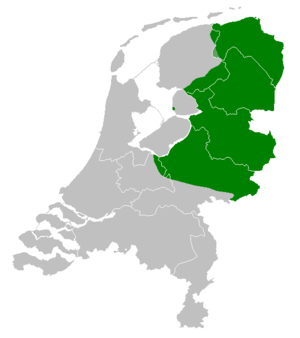West Low German
| West Low German | |
|---|---|
| Native to | Germany, Netherlands, Denmark |
Native speakers | 4 million (date missing) |
|
Indo-European
| |
| Language codes | |
| ISO 639-2 |
nds |
| ISO 639-3 |
Variously: wep – Westphalian nds – (partial) frs – Eastern Frisian gos – Gronings stl – Stellingwerfs drt – Drents twd – Twents act – Achterhoeks sdz – Sallands vel – Veluws |
| Glottolog | None |
|
Low Saxon language area | |
West Low German, also known as Low Saxon (literally: Nether-saxon; Low German: Nedersassisch, Nedersaksies, Platduuts, Plat(t); Dutch: Nedersaksisch; German: Niedersächsisch), is a group of dialects spoken in parts of the Netherlands, Germany and Denmark. Together with East Low German it forms the dialect group of Low German language (German: Niederdeutsch or Plattdeutsch, Dutch: Nederduits).
Extent
The language area comprises the North German states of Lower Saxony, North Rhine-Westphalia (the Westphalian part), Bremen, Hamburg, Schleswig-Holstein and Saxony-Anhalt (the northwestern areas around Magdeburg) as well as the northeast of The Netherlands (i.e. Dutch Low Saxon, spoken in Groningen, Drenthe, Overijssel and northern Gelderland) and the Schleswigsch dialect spoken by the North Schleswig Germans in the southernmost part of Denmark.
In the south the Benrath line and Uerdingen line isoglosses form the border with the area, where West Central German variants of High German are spoken.
List of dialects
Germany
- West Low German
- Westphalian language around Münster, including the Osnabrück region of Lower Saxony
- Eastphalian language, spoken in southeastern Lower Saxony (Hanover, Braunschweig, Göttingen) and in the Magdeburg Börde region
- Northern Low Saxon
- Schleswigsch[1]
- Holsteinisch[2]
- Ollnborger Platt in the Oldenburg region[3]
- East Frisian Low Saxon in East Frisia[4]
- North Hanoveranian[5]
- Dithmarsch[6]
- Emsländisch[7]

The Netherlands
While Dutch is classified as a Low Franconian language, the Dutch Low Saxon varieties, which are also defined as Dutch dialects, form a dialect continuum with the Westphalian language. They consist of:
- Westerkwartiers, in western Groningen
- Gronings, in Groningen and northern Drenthe, by its Frisian substratum related to Friso-Saxon dialects
- Stellingwarfs in southeastern Friesland
- Midden-Drents
- Zuud-Drèents
- Tweants and Tweants-Groafschops in the Twente region of Overijssel and the adjacent Achterhoek region of Gelderland
- Gelders-Overijssels
- Veluws in the Veluwe region of Gelderland
Denmark
- Schleswigsch dialect spoken in former South Jutland County (the northern part of the former Duchy of Schleswig) around Aabenraa (Apenrade)
References
- ↑ Noble, Cecil A. M. (1983). Modern German dialects New York [u.a.], Lang, p. 103-104
- ↑ Noble, Cecil A. M. (1983). Modern German dialects New York [u.a.], Lang, p. 103-104
- ↑ Noble, Cecil A. M. (1983). Modern German dialects New York [u.a.], Lang, p. 103-104
- ↑ Noble, Cecil A. M. (1983). Modern German dialects New York [u.a.], Lang, p. 103-104
- ↑ Noble, Cecil A. M. (1983). Modern German dialects New York [u.a.], Lang, p. 103-104
- ↑ Noble, Cecil A. M. (1983). Modern German dialects New York [u.a.], Lang, p. 103-104
- ↑ Noble, Cecil A. M. (1983). Modern German dialects New York [u.a.], Lang, p. 103-104
